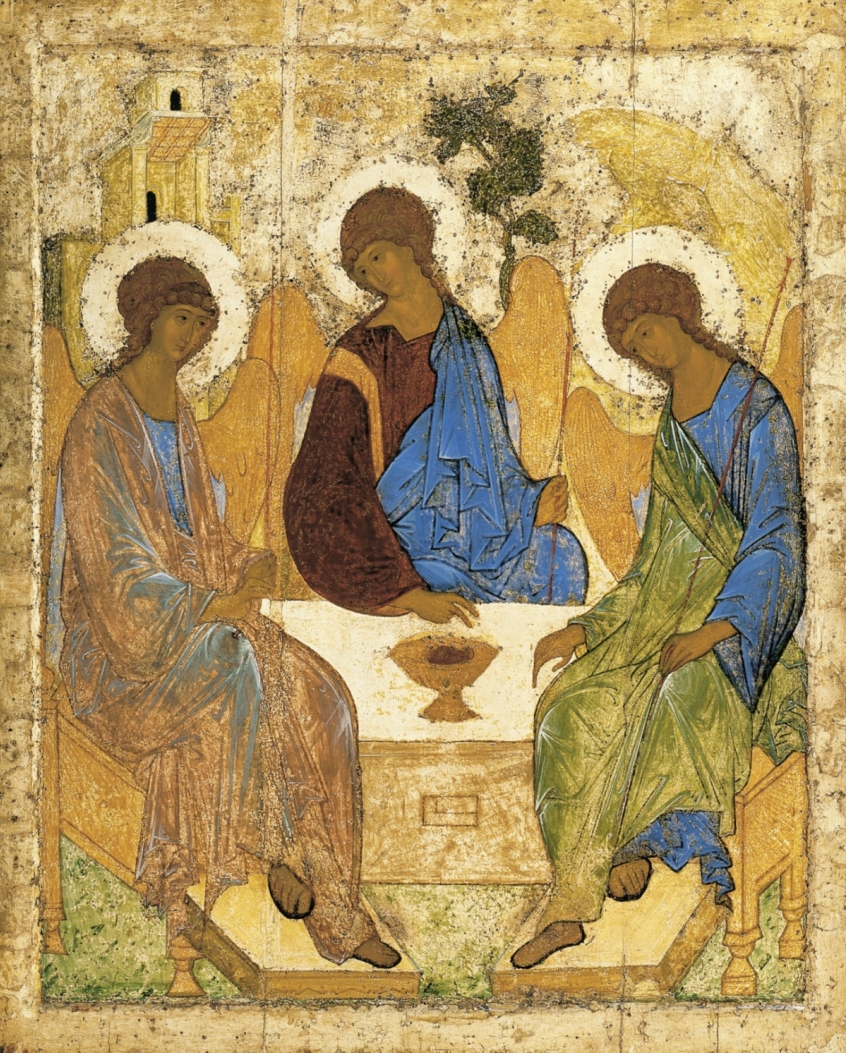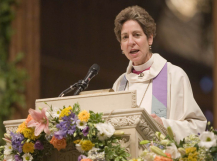
The "complementarianian" view of male-female relations – that men and women are prescribed different, heirarchical roles which above all mean that women cannot preach or be church leaders – is a growing force in modern evangelicalism. It's espoused by figures including John Piper, who notoriously suggested to a woman that she shouldn't be a police officer because it would mean giving orders to men.
Many who hold this view do so because of passages in Paul's letters, particularly 1 Timothy 2:12, "I do not permit a woman to teach or to assume authority over a man; she must be quiet." Some, however, have gone much, much further. They ground the view that women should be subordinate to men in an account of the doctrine of the Trinity that many orthodox Christian scholars regard as simply heretical.
Who are these people? They should go and read some theology.
They have. Among them are Phoenix Seminary's Prof Wayne Grudem, who co-founded the Council on Biblical Manhood and Womanhood, the Southern Baptist Theological Seminary's Prof Bruce Ware, and, in the UK, the principal of Oak Hill Theological College, Dr Michael Ovey. His book Your Will Be Done: Exploring Eternal Subordination, Divine Monarchy and Divine Humility has just been been published by the Latimer Trust.

Ah. But I thought the doctrine of the Trinity was pretty much settled?
It was, and most people would say it is. The idea that God is one, in three persons, is a core Christian belief that was thrashed out in the early centuries of the Church and expressed in the creeds that are accepted across all Christian confessions. A key component of this doctrine, established at the fourth-century Council of Nicea, is that Father, Son and Holy Spirit are distinguished in their roles and functions (the 'economic Trinity', but equal (as the 'immanent' or 'ontological' Trinity'). Nicea was called in response to the threat to orthodoxy posed by the heretic Arius and his followers (the "Arians"). Arius taught that the Son was subordinate to the Father because he was created by him and homoiousios, "of a similar substance", a view rejected by the Council, which held they were homoousios or "of the same substance". So the difference between heresy and orthodoxy is a single letter, which is rather alarming.
I don't get the connection with male headship and women having to be barefoot and pregnant.
That's a little hard on complementarians. In recent years, the consensus on the Trinity has been challenged by theologians arguing that Jesus is eternally subordinate to God the Father and that this provides a pattern for how men and women should relate to each other – that is, women should be subordinate to men. It's a view that has gained ground in Southern Baptist and neo-Calvinist circles (with which The Gospel Coalition is identified) thanks to its influential proponents.
It's also, according to many scholars, a radical departure from what the Church has taught for more than 1500 years, and a serious misunderstanding of a core Christian belief that needs to be flatly rejected by Christians concerned for biblical orthodoxy.
It seems rather radical. What's kicked off the debate?
Most recently, Grudem and his supporters have been trenchantly attacked in pieces by the highly respected pastor-theologian Liam Goligher of the Alliance of Confessing Evangelicals. In his articles on the Mortification of Spin website Goligher, a Scot who serves as pastor of Tenth Presbyterian Church in Philadelphia, takes issue with Grudem's position on the Trinity. He contrasts statements from Grudem and Ware with quotations from the historic creeds, concluding: "It comes down to this; if they are right we have been worshipping an idol since the beginning of the church; and if they are wrong they are constructing a new deity – a deity in whom there are degrees of power, differences of will, and diversity of thought. Because, mark this, to have an eternally subordinate Son intrinsic to the Godhead creates the potential of three minds, wills and powers. What they have done is to take the passages referring to the economic Trinity and collapse them into the ontological Trinity."
Nothing trivial, then.
No. Goligher believes that: "What we have is in fact a departure from biblical Christianity as expressed in our creeds and confessions. Out of that redefinition of God their teaching is being used to promote a new way of looking at human relationships which is more like Islam than Christianity; more concerned with control and governance than with understanding the nuances of the relationship of the Son with His Father in eternity on the one hand and how that differs from the roles they adopt in the economy of redemption on the other."
And, in an incendiary charge, he says, such views "should certainly exclude such people from holding office in the church of God".
So Grudem, Ware, Ovey et al should just resign?
Yes. In a second article Goligher is if anything even more direct, saying: "God has revealed Himself as Trinity. To speculate, suggest, or say that there is a real primacy of the Father or subordination of the Son within the eternal Trinity is to have moved out of Christian orthodoxy and to have moved or be moving towards idolatry." He concludes: "What we face in evangelicalism today is at best shoddy thinking and at worst ungodly thinking about the first principle of our religion – "Who is God?" The teaching is so wrong at so many levels that we must sound a blast against this insinuation of error into the body of Christ's church."
Goligher's posts set off a flurry of online argument (helpfully indexed at bringthebooks.org). Among the posts was another from Carl Trueman, who warned of a "heavy dogmatic price to pay" if evangelicals departed from orthodoxy for the sake of expediency. Trueman said: "In the long run such a tight pairing of complementarianism with this theology can only do one of two things. It will either turn complementarian evangelicals into Arians or tritheists; or it will cause orthodox believers to abandon complementarianism. The link is being pushed so firmly that it does not seem to offer any other choice."
I thought Southern Baptists and Calvinists prided themselves on being orthodox?
Indeed. Grudem responded with a post on the Council for Biblical Manhood and Womanhood website expressing surprise at Goligher's charges, denying he was teaching a new doctrine, affirming his belief in the full deity of Christ – and that he was not an Arian – and citing various respected theologians in his defence, from Louis Berkhof to John Calvin. He claimed his views were supported by the Bible and consistent with the historic creeds, concluding of Goligher and Trueman: "Finally, their articles lead me to think that perhaps it is time to forego intemperate accusations of heterodoxy."
Bruce Ware responded too, in a post on the Reformation21 website. He said that "those who affirm the eternal authority of the Father and submission of the Son uniformly and adamantly affirm also the full deity of the Son". Ware denies that an "eternal relation of authority and submission" conflicts with orthodoxy (he denies being an Arian too) and appeals to Scripture in support. He denies he and Grudem are "reformulating" the doctrine of the Trinity to serve their social purposes, as Goligher claimed. Michael Ovey has a post on Credo in which he denies that the eternal subordination of the Son divides the will of God or involves Arianism, concluding: "Hence I am reluctant to accept the suggestion that I am making things up about God and therefore should resign."
Anyone else?
Well, it's not the first time this has been aired. Mike Ovey contributed to a volume of essays mainly by Southern Baptists last year which was heavily critiqued by Kevin Giles, who's written a good deal about this; there's a link through Ian Paul's Psephizo blog. But this time round others pitched in too, on different sides of the argument, notably Scot McKnight (against) and Denny Burk (for). Another theologian, Mike Bird, warns of a coming "miniature civil war" among Calvinist complementarians about Trinity and gender. He suggests calling Grudem, Ware and their disciples "Homoian Complementarians", saying: "Bruce Ware and Wayne Grudem are not Arians, their denials are clear enough on that, but they are perilously close to Homoianism, which is semi-Arianism, or in the very least, they are non-Nicenes." He says this is "a pointless and dangerous position to espouse", concluding: "The root of the problem is that some Complementarians are willing to ditch Nicene christology for Homoian christology if it will give them a bigger stick to use to keep women out of the pulpit!" His post drew a very sharp response from Ovey, who said hadn't ditched Nicene Christology at all and that he and others asserted "both that the Son eternally submits to his Father (as a son at the level of Person) while being of one and the same nature (at the different level of substance/nature)". He also said he wasn't motivated by complementarianism (though he is a complementarian).
Just tell me what to think. Please.
Very few people reading this are systematic theologians, and very few have the leisure or resources to be able to weigh the arguments carefully for themselves. These can seem bafflingly obscure, along the lines of how many angels can dance on the head of a pin. So for most thinking Christians, the argument comes down to, "Whom do I trust?"
In this case, we need to recognise three things. First, while the proponents of homoian complementarianism, as Bird calls it, might argue that their views are consistent with historic Christianity, most scholars and theologians haven't expressed their belief in the Trinity like that and many experts in the field are pretty scathing about it. So it is, to that extent, a new way of talking about this doctrine that is, as Goligher says, open to serious criticism. We should be very slow to accept theological novelties.
Second, the Trinity is one thing and complementarianism is another. While some proponents of the new thinking might deny that they're linked in essence, in practice homoian complementarians have a social agenda. We should be very suspicious of any theology that rewrites millennia of tradition to serve the priorities of the moment.
Third, homoian complementarians are part of a very influential movement in modern theology and churchmanship. It's socially right-wing, deeply conservative and neo-Calvinist, with deep pockets, charismatic and successful figureheads and granite certainties. That doesn't make it right.
Is this way of thinking about the Trinity heresy, or can it sit, however uneasily, alongside a more traditional understanding? This is a discussion that will play out over years, if not decades. But in the meantime, if people really feel they must be complementarians, they would be wise not to ground their views on such a very contentious re-interpretation of the Trinity.
Follow Mark Woods on Twitter: @RevMarkWoods


















